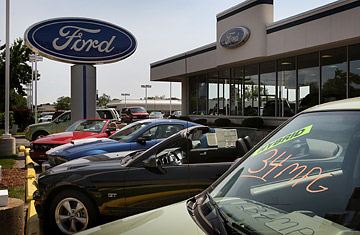
Ford vehicles at the lot of a new-car dealership in Glenview, Ill.
Ford CEO Alan Mulally could be forgiven if he thought, The heck with this — don't give us any money, as he and fellow auto bosses Rick Wagoner and Robert Nardelli took a beating from unfriendly Senators at a hearing in Washington on Tuesday.
The reason is that Ford alone among the Detroit Three has enough dry powder to get through what will be a very difficult 2009, when car sales aren't expected to top the 11.8 million units sold this year. (In 2007, 16 million cars and light trucks were sold.) General Motor's Wagoner and Chrysler's Nardelli made it pretty clear that without a government bridge loan — $12 billion in GM's case, $7 or $8 billion for Chrysler — there isn't going to be a 2010 for these companies, at least not without a pit stop in bankruptcy. Chrysler ended its third quarter with $6.1 billion in cash — but it's burning through $1 billion a month. Without federal money, Nardelli told the Senate Committee on Banking, Housing and Urban Affairs, "we become dangerously close to minimum liquidity level by the end of the year." (See pictures of the global financial crisis.)
Ford, relatively speaking, is loaded. The company still had $18.9 billion in cash at the end of the third quarter despite having burned through $7.7 billion in that period — half of which was tied to halting the production of F Series pickups because of slow sales. The company recently introduced a new version. Ford Credit, the company's finance arm, remains profitable because, unlike GM's 49%-owned bank, GMAC, it doesn't have a subprime mortgage business. On top of that, Ford can still draw on credit lines totaling $10.1 billion. "We are doing everything we can to create a relevant company for the long term," Mulally told the committee.
That includes balancing out Ford's U.S. product line by importing small, fuel-efficient models that have been doing well in Europe, where high fuel costs have been a constant for decades. European auto sales have also declined this year, but Ford has picked up market share. "We are shifting from an emphasis on large trucks and SUVs to a more balanced portfolio that also emphasizes smaller and more fuel-efficient vehicles here in the U.S.," Mulally said. "By the end of 2010, two-thirds of our spending here will be on cars and crossovers — up from one-half today." So if Congress doesn't pass an auto bailout plan, Ford could actually prosper by not failing. (See the 50 worst cars of all time.)
Ford is by no means wishing doom on its fellow Detroiters. It shares most of the same big parts suppliers, so a disruption in the supply chain that a bankruptcy would invariably cause would hurt Ford too, and even halt production temporarily. But longer term, customers might flock to a U.S. company that isn't in bankruptcy and thus stands 100% behind its products — and is free to operate without court supervision.
The Republicans on the committee were highly unimpressed by the performance of the Detroit Three, openly questioning why the government shouldn't let them fail, if that was what was needed to bring costs down, and whether the proposed $25 billion in bridge loans wasn't simply a down payment. But several noted that Ford is at the head of the class. "My sense is that Ford has done a better job," said Senator Bob Corker, who added that "GM is spiraling downward and in serious trouble" and that Chrysler "barely has a heartbeat." He then called on Ron Gettelfinger, president of the United Auto Workers, to rate the companies. "I'd rank 'em Ford, Chrysler and General Motors," the union man responded. That won't get Mulally any more money, but at least he knows where he stands in the halls of Congress and the union.
